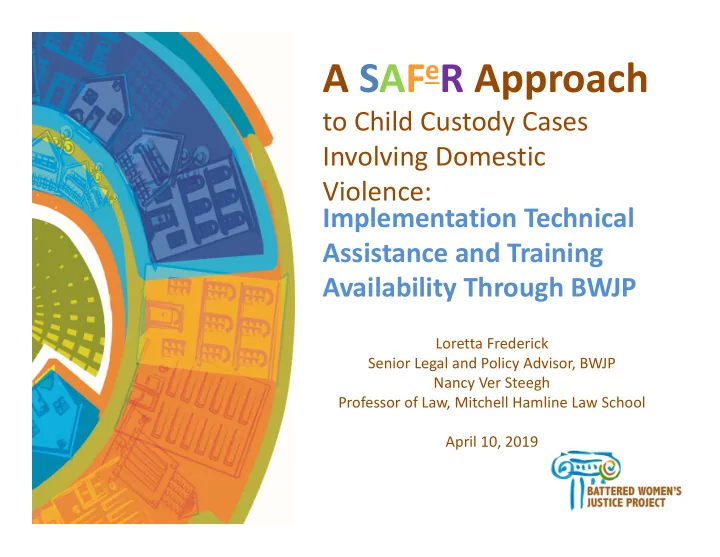

A SAF e R Approach to Child Custody Cases Involving Domestic Violence: Implementation Technical Assistance and Training Availability Through BWJP Loretta Frederick Senior Legal and Policy Advisor, BWJP Nancy Ver Steegh Professor of Law, Mitchell Hamline Law School April 10, 2019
OVW Disclaimer – Thanks to OVW! • This project was supported by Grant No. 2018‐TA‐AX‐K012 awarded by the Office on Violence Against Women, U.S. Department of Justice. The opinions, findings, conclusions, and recommendations expressed in this training are those of the faculty and do not necessarily reflect the views of the Department of Justice, Office on Violence Against Women.
Webinar Objectives Participants will be able to: • Identify the elements of the SAF e R approach to child custody disputes involving domestic violence • Describe the utility of SAF e R tools and practice guides • Plan for implementation of SAF e R through local trainings and technical assistance
The Problem People’s Experience of IPV Institutional Responses to IPV
Background Henry County Custody Expert Focus Groups Evaluations Interviews • Case Files • Battered Parents • Observations • Reports • Researchers • Batterer • Interviews • Facilitated • Advocates Intervention Analysis • Focus Groups • Judges • Attorneys • Practitioners • Guardians • CASAs
Emerging Themes Ill‐defined terminology Inconsistent assessments/assumptions Lack of reliable information Poorly informed decision‐making Disconnected interventions and services
Interconnections Disconnected interventions Poorly & services informed decision‐ Lack of making reliable information Inconsistent assessments Ill‐defined terms
Research • Practitioners’ knowledge, assumptions, and beliefs about IPV ( and other concepts like alienation, gatekeeping, and high conflict ) are more closely associated with their approach to (and outcomes of) these cases than what’s going on in the real life of the parties. ‐ Saunders, et al.; Hardesty, et al.; Davis, et al. • Many of these concepts are being applied even though there’s widespread disagreement in the field about what they mean and why they matter. ‐ Fidler, Bala, & Saini
Closing the gap between people’s experience of IPV and institutional responses to it.
SAF e R What is What can actually be done going on? about it ? Assess the Focus on Screen for Nature & Respond to the Effects IPV Context of IPV of IPV IPV Is abuse Why does an issue it here? matter?
Worksheets F e S A R Screening for IPV Assessing IPV Focusing on Effects of IPV Responding to IPV www.bwjp.org
Worksheets S
Screening Guide
Interview Guide Screening Assessing Focusing on Responding Effects
Worksheets A
Worksheets F e
Worksheets R
Rest of the worksheets Basic worksheets Detailed worksheets Specialized worksheets www.bwjp.org
SAF e R Approach
A BUSE OF V ICTIM ‐ P ARENT
Focusing on the Effects: Child Custody and Parenting Time/Visitation
SAF e R
SAF e R
SAF e R
SAF e R
SAF e R
SAF e R
Other specialized SAF e R worksheets • Accounting for Abuse in Orders for Protection (child related relief) • Motions to Terminate or Modify CPOs • Mediation Discussion Guide
Recap…. • SAF e R tools and worksheets are available to help: • Encourage safe and informed disclosure of domestic violence • Elicit detailed information about the nature, context, and impact of abuse • The key is to: • Assess the full nature and context of abuse • Focus on the impact abuse has on the issue or concern at hand • Develop strategies that account for the real life experience of abuse
How to Promote the Implementation of the SAF e R Approach in Your Community
SAF e R Training Availability: Options • Standard or Customized • Multidisciplinary Statewide Regional Local
SAF e R Training Availability: Options • Discipline‐specific • Advocates • Attorneys • Guardians ad Litem • Mediators • Judges • Custody Evaluators
SAF e R Training Availability: Options The Minimum : Introduction to SAF e R 60‐90 minutes Standalone presentation OR Workshop offered at an existing conference OR Plenary At an existing conference At an annual or special meeting
SAF e R Training Availability: Options The Maximum #1: Intensive 2‐day skill‐building institute for a specific professional group advocates attorneys mediators guardians ad litem judicial officers custody evaluators etc.
SAF e R Training Availability: Options The Maximum #2 Intensive 2‐day institute focused on application to one legal setting Civil protection order cases child custody cases mediations
SAF e R Training Availability: Options In Between: Half day or full day in depth sessions • Profession specific • Case‐type specific
SAF e R Implementation Technical Assistance • Map intervention points and practitioners • Identify challenges in SAFeR implementation • Choose challenge areas to address • Choose a range of strategies to address • each challenge areas • Customize tools and trainings • Consultations
SAF e R Assess the Focus on Screen for Nature & Respond to the Effects IPV Context of IPV of IPV IPV
SAF e R Questions, Comments, Requests Loretta Frederick lfrederick@bwjp.org This project is supported by Award 2018‐TA‐AX‐K012 from the Office on Violence Against Women, US Department of Justice. The opinions, findings, conclusions, and recommendations expressed herein are those of the author(s) and do not necessarily reflect the views of the US Department of Justice.
Recommend
More recommend